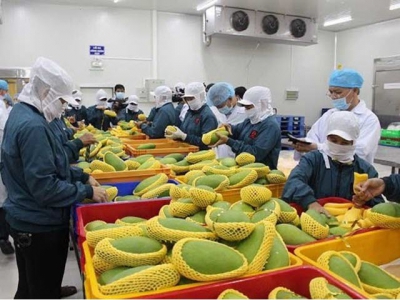Local fruit, vegetable businesses seek to meet global demands

The local fruit and vegetable processing sector must strive to improve quality in an effort to meet stringent requirements set by various import markets worldwide in order to achieve the export target of US$10 billion by 2030, according to industry insiders.
Despite the COVID-19 impact, Vietnamese fruit and vegetable exports increased by 6.1% in the first three months of the year compared to a year ago, reaching US$944 million .
The boost was largely attributed to Vietnam’s successful containment efforts of the COVID-19 pandemic, according to the Ministry of Industry and Trade (MoIT).
The country mainly exported the items to China, its largest trade partner, during the initial two months of the year, raking in US$352.83 million, up 17.5% against the same period from last year. China was followed by such markets as the United States, Thailand, Japan, and the Republic of Korea
Similarly, Vietnamese fruit and vegetable exports to Taiwan (China), Australia, and Malaysia have all skyrocketed, surging by 43.1%, 30.6%, and 32.5%, respectively, compared to last year’s corresponding period.
Economic experts reveal Vietnamese fruit and vegetable businesses have also boosted their exports to many other large markets with great potential, including Egypt, Kuwait, Ukraine, and Senegal since the beginning of the year.
This is a positive signal for the local fruit and vegetable processing sector to boost export value over the course of this year and subsequent years, they say.
Dang Phuc Nguyen, general secretary of the Vietnam Fruit and Vegetable Association, underlines the importance of taking full advantage of new generation free trade agreements (FTAs) in ramping up exports. The FTAs include the EU-Vietnam Free Trade Agreement (EVFTA), the Comprehensive and Progressive Agreement for Trans-Pacific Partnership (CPTPP), and the Regional Comprehensive Economic Partnership (RCEP), all of which will serve to help local firms boost export turnover this year.
The Vietnam-UK Free Trade Agreement (UKFTA) in particular is anticipated to give fresh impetus to economic and trade co-operation between the two countries in the near future.
Once the trade pact takes effect, more than 94% out of a total of 547 tax lines for fruits and vegetables will be slashed to 0%. Fruits such as litchi, longan, rambutan, dragon fruit, pineapple, and melons are expected to enjoy advantages to expand into new markets compared to rivals such as Brazil, Thailand, and Malaysia as they have yet to sign an FTA with the UK.
Related news
 Adoption of high technologies needs promoting for sustainable agriculture
Adoption of high technologies needs promoting for sustainable agriculture Aquaculture is more and more developing and plays an important role in the world. The global aquaculture production is currently above 82 million tons.
 Rice exports down in volume, up in price
Rice exports down in volume, up in price In the first months of the year, Vietnam’s rice exports volume decreased sharply compared to the same period in 2020.
 Việt Nam aims to reduce greenhouse gas emissions in rice sector
Việt Nam aims to reduce greenhouse gas emissions in rice sector Agencies in Việt Nam and international partners have been working together to seek effective measures to reduce the emission of greenhouse gases in rice product